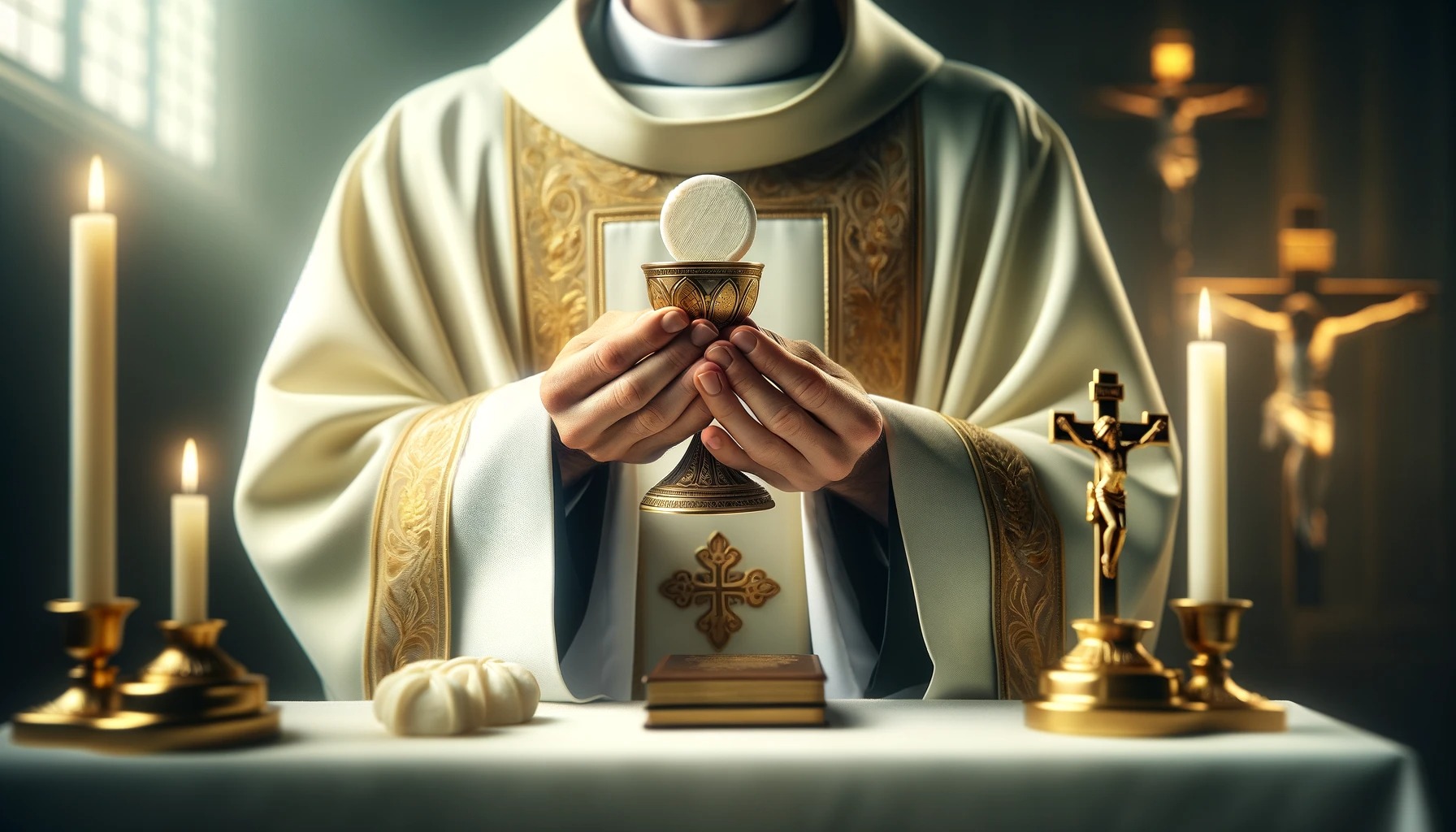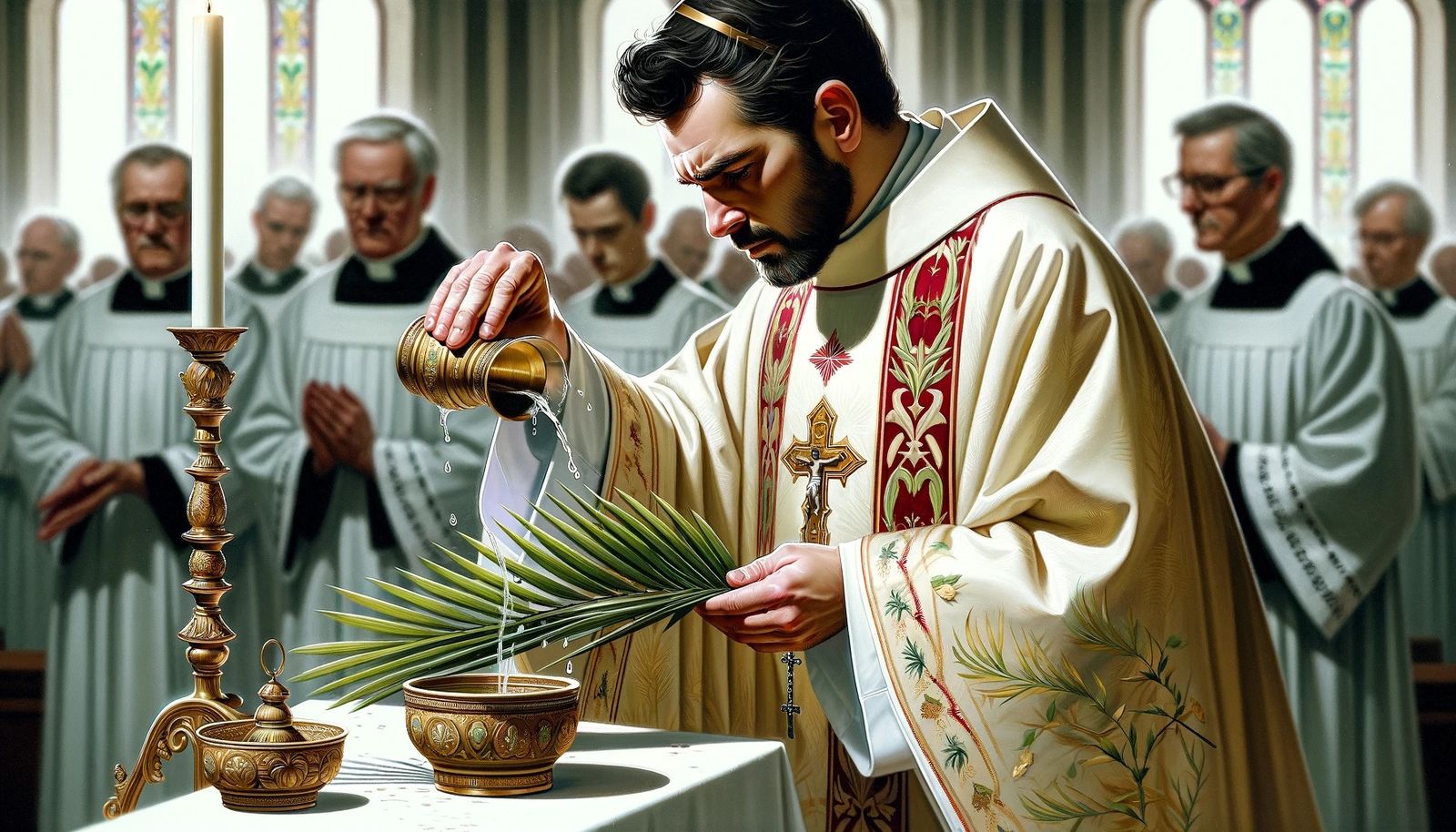Home>Theology and Spirituality>In Catholicism: What Do We Mean By “Become What We Eat”?


Theology and Spirituality
In Catholicism: What Do We Mean By “Become What We Eat”?
Published: February 18, 2024
Ericka Andersen, an editor at Christian.net, expertly merges digital strategy with content creation, focusing on faith and societal issues. Her communication skills enhance the platform's engaging narratives, fostering meaningful dialogue on belief's impact on society.
Explore the concept of "Become What We Eat" in Catholic theology and spirituality. Understand the significance of this principle in the context of faith and communion.
(Many of the links in this article redirect to a specific reviewed product. Your purchase of these products through affiliate links helps to generate commission for Christian.net, at no extra cost. Learn more)
Table of Contents
Introduction
The Eucharist, also known as Holy Communion, is a central sacrament in the Catholic faith. It is a sacred ritual that commemorates the Last Supper, during which Jesus Christ instituted the practice of consuming bread and wine as symbols of his body and blood. This act of partaking in the Eucharist is deeply significant for Catholics, as it represents a profound spiritual union with Christ and the community of believers.
The phrase "become what we eat" holds a special place in the hearts of Catholics, as it encapsulates the transformative nature of the Eucharist. This concept goes beyond the physical act of consuming bread and wine; it delves into the spiritual and symbolic implications of this sacred ritual. Understanding the profound meaning behind "become what we eat" is essential for grasping the depth of the Eucharistic celebration and its impact on the lives of believers.
In this article, we will explore the theological significance of the Eucharist in Catholicism, delve into the concept of "become what we eat," and unravel the spiritual and symbolic implications of this profound sacrament. By delving into these aspects, we aim to shed light on the importance of the Eucharist in the Catholic faith and its transformative power in the lives of believers. Let us embark on a journey to uncover the spiritual richness and depth encapsulated within the phrase "become what we eat" in the context of the Eucharist in Catholicism.
Read more: What Is The Meaning Of Catholicism
The Eucharist in Catholicism
The Eucharist, also referred to as the Holy Communion, stands as one of the fundamental sacraments in the Catholic faith. Rooted in the biblical accounts of the Last Supper, where Jesus Christ shared bread and wine with his disciples, the Eucharist holds profound significance for Catholics worldwide. It is a sacred ritual that symbolizes the body and blood of Christ, representing the ultimate sacrifice made for the redemption of humanity.
Central to the Eucharistic celebration is the concept of transubstantiation, a theological doctrine that asserts the transformation of the bread and wine into the actual body and blood of Christ during the consecration by the priest. This belief underscores the real presence of Christ in the Eucharist, emphasizing the spiritual nourishment and communion with the divine that Catholics experience through partaking in this sacrament.
The Eucharist serves as a spiritual banquet, inviting believers to partake in the body and blood of Christ, thereby fostering a deep sense of unity and communion with the Lord and fellow members of the faith community. It is a sacred moment of encounter with the living Christ, where believers are called to reflect on the profound love and sacrifice demonstrated through the offering of his body and blood for the salvation of humanity.
Furthermore, the Eucharist is not merely a symbolic gesture but a transformative encounter that transcends the physical realm. It is a sacred mystery that bridges the earthly and the divine, inviting believers to enter into a profound union with Christ. Through the reception of the Eucharist, Catholics are nourished spiritually, finding sustenance for their souls and strength for their spiritual journey.
The Eucharist also serves as a source of grace, offering believers the opportunity for spiritual renewal and transformation. It is a moment of intimate communion with Christ, where believers are invited to open their hearts to receive the abundant grace and blessings flowing from the Eucharistic encounter. This sacrament holds the power to heal, restore, and uplift the faithful, nurturing their faith and deepening their relationship with God.
In essence, the Eucharist stands as a sacred testament to the enduring presence of Christ in the life of the Church and the individual believer. It is a profound expression of God's love and mercy, inviting believers to partake in the divine life and be nourished by the spiritual sustenance offered through the body and blood of Christ. The Eucharist in Catholicism embodies the transformative power of Christ's presence, offering believers a tangible experience of communion with the divine and the opportunity for spiritual growth and renewal.
The Concept of "Become What We Eat"
The phrase "become what we eat" encapsulates the profound spiritual and transformative essence of the Eucharist in Catholic theology. At its core, this concept signifies the belief that through the consumption of the consecrated bread and wine, Catholics are spiritually nourished and united with the person of Jesus Christ. This union extends beyond a mere symbolic representation; it delves into the very fabric of the believer's spiritual identity and communion with the divine.
In the context of the Eucharist, "become what we eat" signifies a profound spiritual assimilation, wherein believers partake in the body and blood of Christ, thereby uniting themselves with His divine nature. This transformative act goes beyond the physical consumption of bread and wine; it represents a spiritual incorporation of Christ's presence into the lives of believers. Through this sacred communion, Catholics are called to embody the teachings, virtues, and love exemplified by Christ, thereby becoming more Christ-like in their thoughts, actions, and character.
The concept of "become what we eat" also underscores the transformative power of the Eucharist in shaping the spiritual journey of believers. As Catholics partake in the body and blood of Christ, they are invited to undergo a profound inner transformation, wherein their spiritual nourishment leads to a deeper alignment with the values and teachings of Christ. This transformative process extends to the believer's interactions with others, as they are called to manifest the love, compassion, and selflessness embodied by Christ in their daily lives.
Moreover, "become what we eat" emphasizes the intimate union between the believer and Christ, wherein the spiritual nourishment received through the Eucharist fosters a deeper communion with the divine. This union transcends the physical realm, permeating the depths of the believer's soul and spirit, thereby shaping their worldview, values, and relationship with God and others.
In essence, the concept of "become what we eat" in the context of the Eucharist underscores the transformative and unifying nature of this sacred sacrament. It invites believers to partake in the divine life, embody the teachings of Christ, and foster a profound communion with the living presence of Jesus Christ. Through this spiritual assimilation, Catholics are called to embrace their identity as children of God, reflecting the love and grace received through the Eucharistic encounter in their daily lives.
The Spiritual and Symbolic Meaning
The Eucharist holds profound spiritual and symbolic significance within the Catholic faith, serving as a sacred conduit for believers to encounter the living presence of Jesus Christ. At its core, the Eucharist embodies the spiritual nourishment and communion with the divine, transcending the physical elements of bread and wine to convey a deeper, symbolic reality.
Spiritually, the Eucharist represents a transformative encounter with Christ, wherein believers are invited to partake in the divine life and be nourished by the grace and love emanating from the body and blood of Christ. This sacred communion fosters a profound union with the living Christ, offering believers the opportunity for spiritual renewal, healing, and inner transformation. Through the reception of the Eucharist, Catholics are invited to open their hearts to the abundant grace and blessings flowing from this sacred encounter, thereby deepening their relationship with God and finding sustenance for their spiritual journey.
Symbolically, the Eucharist serves as a powerful representation of the unity and communion within the body of Christ. As believers partake in the Eucharistic celebration, they are reminded of their interconnectedness with the larger faith community, transcending geographical, cultural, and societal boundaries. The act of sharing in the body and blood of Christ signifies a profound unity among believers, reflecting the shared identity as members of the mystical body of Christ. This symbolic dimension of the Eucharist underscores the communal aspect of the faith, emphasizing the interconnectedness and mutual support among believers as they journey together in faith.
Furthermore, the Eucharist symbolizes the sacrificial love and self-offering exemplified by Jesus Christ. The bread and wine, transformed into the body and blood of Christ, serve as tangible reminders of Christ's ultimate sacrifice on the cross for the redemption of humanity. This symbolic representation of Christ's selfless love invites believers to reflect on the profound act of redemption and to emulate the virtues of love, compassion, and selflessness in their own lives. The Eucharist, therefore, becomes a powerful symbol of Christ's enduring presence and love, inspiring believers to embody these virtues in their interactions with others and in their service to the world.
In essence, the spiritual and symbolic meaning of the Eucharist in Catholicism encompasses a profound encounter with the living Christ and a symbolic representation of unity, sacrificial love, and communal communion. It stands as a testament to the enduring presence of Christ in the life of the Church and the individual believer, offering a transformative and unifying experience that shapes the spiritual identity and communal bonds within the Catholic faith.
The Importance of the Eucharist in Catholic Faith
The Eucharist holds paramount importance in the Catholic faith, serving as the central sacrament that embodies the spiritual nourishment, communal unity, and transformative encounter with the living Christ. At the heart of Catholic theology, the Eucharist stands as the pinnacle of worship and spiritual sustenance, encapsulating the profound significance of Christ's presence in the life of believers and the life of the Church.
First and foremost, the Eucharist is revered as the source and summit of the Christian life. It is through the reception of the Eucharist that Catholics encounter the real presence of Jesus Christ, partaking in His body and blood, and experiencing a profound communion with the divine. This sacred encounter fosters spiritual nourishment, offering believers the grace, strength, and sustenance needed for their spiritual journey. The Eucharist becomes a transformative wellspring of grace, renewing the spiritual vitality of believers and deepening their relationship with God.
Moreover, the Eucharist serves as a powerful expression of communal unity within the Catholic faith. As believers gather to partake in the Eucharistic celebration, they are reminded of their interconnectedness as members of the body of Christ. This communal aspect of the Eucharist underscores the shared identity and solidarity among believers, transcending differences and fostering a sense of belonging within the faith community. The Eucharist becomes a sacred bond that unites believers in their shared faith, values, and mission, strengthening the communal fabric of the Church.
Furthermore, the Eucharist symbolizes the sacrificial love and self-offering exemplified by Jesus Christ. As Catholics partake in the body and blood of Christ, they are called to reflect on the profound act of redemption and to embody the virtues of love, compassion, and selflessness in their lives. This transformative aspect of the Eucharist extends beyond the individual believer, shaping the collective ethos of the Church as a community called to emulate Christ's love and service in the world.
In essence, the Eucharist holds profound importance in the Catholic faith, embodying the spiritual nourishment, communal unity, and transformative encounter with the living Christ. It stands as the sacred wellspring of grace, uniting believers in communal solidarity, and inspiring them to embody Christ's love and self-offering in their lives. The Eucharist remains the enduring centerpiece of Catholic worship, offering believers a tangible experience of communion with the divine and the opportunity for spiritual growth and renewal.
Read more: What Do People Eat On Advent
Conclusion
In conclusion, the phrase "become what we eat" encapsulates the profound spiritual and transformative essence of the Eucharist in Catholic theology. The Eucharist, as the central sacrament in the Catholic faith, represents a sacred encounter with the living presence of Jesus Christ. Through the consumption of the consecrated bread and wine, believers partake in the body and blood of Christ, fostering a deep spiritual union and communion with the divine. This transformative act extends beyond a mere symbolic representation; it signifies a profound spiritual assimilation, wherein believers are called to embody the teachings, virtues, and love exemplified by Christ, thereby becoming more Christ-like in their thoughts, actions, and character.
The spiritual and symbolic meaning of the Eucharist underscores its significance as a transformative encounter with Christ and a powerful representation of unity, sacrificial love, and communal communion within the Catholic faith. It serves as a testament to the enduring presence of Christ in the life of the Church and the individual believer, offering a transformative and unifying experience that shapes the spiritual identity and communal bonds within the Catholic faith.
The importance of the Eucharist in the Catholic faith cannot be overstated. It stands as the pinnacle of worship and spiritual sustenance, offering believers a tangible experience of communion with the divine and the opportunity for spiritual growth and renewal. The Eucharist serves as a source of grace, communal unity, and inspiration for embodying Christ's love and self-offering in the world. It remains the enduring centerpiece of Catholic worship, inviting believers to partake in the divine life, reflect on the profound act of redemption, and embrace their identity as children of God.
In essence, the Eucharist, with its profound spiritual, symbolic, and communal significance, continues to nourish the faith and spiritual journey of Catholics worldwide. It stands as a testament to the enduring presence of Christ in the life of the Church and the individual believer, offering a transformative and unifying experience that shapes the spiritual identity and communal bonds within the Catholic faith. The phrase "become what we eat" resonates deeply with believers, reminding them of the transformative power of the Eucharist and the call to embody Christ's love and teachings in their lives.














